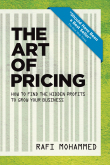Why Online Retailers' New Pricing Strategy Will Backfire
Reprinted from the Harvard Business Review website.
It's emerged as this season's hot holiday pricing strategy for online retailers such as Amazon and Best Buy: dynamic pricing. That's the strategy, employed by industries such as airlines, in which a seller moves prices up and down quickly, charging similar customers different prices for the same product or service. What's surprised me is how extreme these price fluctuations have been. During Thanksgiving week, for instance, The New York Times tracked the price of Dance Central 3, a popular Xbox game, as it dropped from $49.96 to $24.99 to $15. While such a drastic price change is atypical, I've found 15% - 25% price swings to be more common.
From a pricing perspective, there are a variety of reasons why retailers are employing dynamic pricing. And while changing prices may reap short term riches, this practice can destroy long term profits. Retailers need to understand that how they set prices is a key component of their brand ‘ and any changes can adversely affect both their brand as well as how consumers shop.
It's a lesson Apple learned painfully. In September 2007, just 68 days after introducing the iPhone, Apple dropped its price from $599 to $399. Consumers who purchased early were livid about this quick discount. Apple gracefully handled this debacle by apologizing and offering a $100 credit for Apple products. Netflix hasn't fared so well in handling a similar uproar. In July 2011, Netflix announced a significant price increase that incensed consumers. Netflix remained tone deaf to the mounting rage and as a result, within three months of this price change, its stock had dropped from $271 to $75.
When a retailer uses dynamic pricing, it's only a matter of time before those who realize they've paid significantly more than others for the same product start screaming "unfair." This is when the big problem erupts for a retailer ‘ the trust component of its brand is at risk.
Ironically, retailers that don't employ dynamic pricing stand to profit from this situation. Costco, for instance, pledges it will not mark-up its products' costs by more than 15%. In an environment of price uncertainty, this pledge seems fair and engenders trust with customers.
It's fair to ask, if consumers have accepted dynamic pricing in the airline and hotel industries, why won't they for retailers? The key difference is that airlines and hotels have to use dynamic pricing. These industries differ from retail in two key aspects: (1) products (airlines seats, hotel rooms) expire at a certain time and (2) demand for a specific flight or hotel night is uncertain ‘ it varies significantly. Given these conditions, it's a necessity to shift prices in accordance with demand. Also, it is easier psychologically for a last minute traveler to understand a high ticket price when they board a jam-packed airplane.
If retailers continue to change prices dramatically, as they've been doing lately, two results are inevitable. First, they'll tarnish their brands. But just as importantly, they risk changing how consumers shop online. Instead of normally going to their favorite online retailer to purchase, with the "fairness trust" gone, they'll more proactively price compare with other sites. Before long, the first stop for online shoppers will be an Orbitz-like price comparison site for products. Pushing shoppers to seek and buy based on the lowest price is not in the best interest for most retailers.
The big lesson for all businesses is to understand that their pricing actions affect their brands. With this in mind, online retailers don't have to abandon dynamic pricing, just modify how they implement it. Be upfront with customers about using dynamic pricing, offer refunds to those who see a lower price after purchase, cap the percentage range of price fluctuations, and with certain limitations, provide automatic refunds to customers in their "prime" programs.
P.S. Briefly interviewed on NPR Marketplace on this topic.




